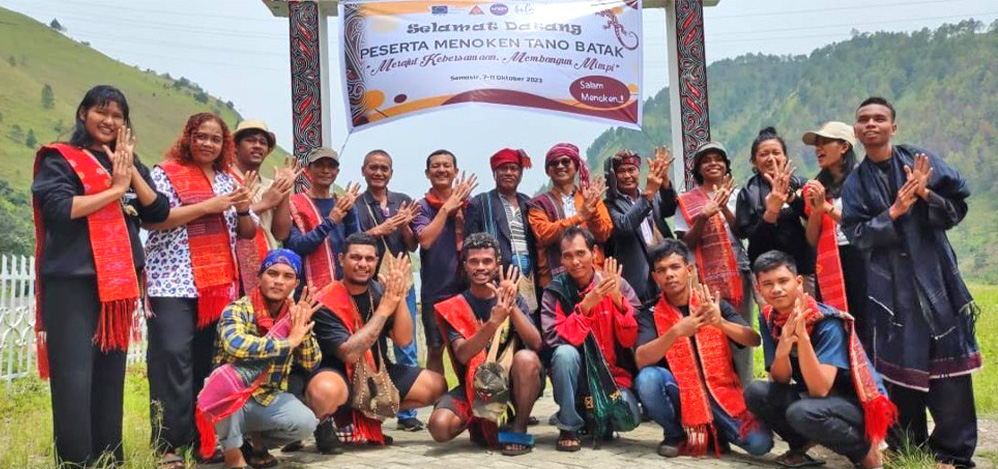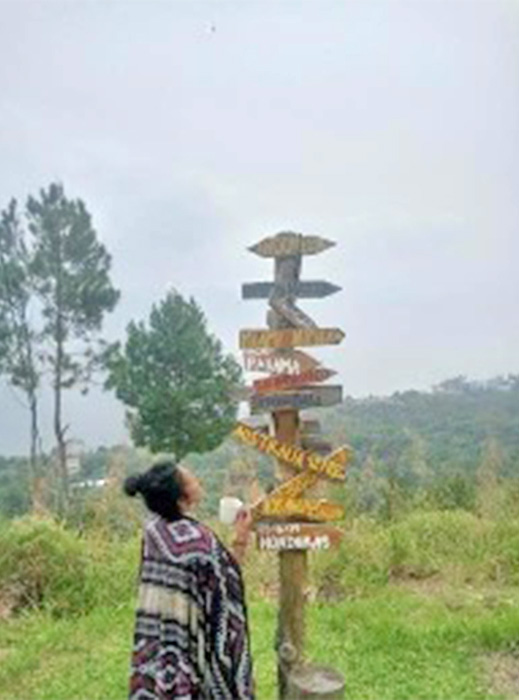
The beginning of the event, held in Sianjur Mula Mula. (doc. Participant of the Menoken)
- admin
- 02 July 2024
- Feature
Menoken Tano Batak
Written by A. Ruwindrijarto |
Dear J,
There’s so much I want to tell you about the recent Menoken event I went to in North Sumatra.
In the heart of Tano Batak, where the mist embraces Lake Toba like a shroud, a group of passionate souls gathered in defiance of the bulldozers and the relentless march of industrialization. We were bound together by a common purpose: to preserve the sanctity of our land and the spirit of our people.
During this event we shared many things together, including music, poems, tuak (palm wine), coffee, meals, rituals and a lot of laughs. We enjoyed the beauty of the lake, the valleys, and the hills. We each had our share of anger, but tempered by passion and love. Defined more by love than hate, we are the proud and beautiful people of Tano Batak.
The day and evening at Harian Boho will forever be etched into our memories; a moment when the weight of our struggle hung heavy in the air. Humanity has been torn asunder by greed. This greed feeds the monster that is grabbing and eating lands, turning a whole living world into a pulp and paper maché. We fight it. We resist.
We were sad and weary, but found solace in music. With a guitar, bamboo flute and percussion, we embarked on a journey through the melodies of our ancestors; a musical tapestry, interwoven with the power of the Batak people.
Songs are some of our weapons, our voices rising against the monstrous forces that sought to devour our land. Safe in our circle, shrouded by the mist enveloping the lake, in the deep mystery of a volcano at rest, we shared ancient tunes and modern ballads. Our playlist, a small fraction of Batak musical heritage, stretched across the night and into the days that followed. With every song, we became stronger.
Each chord struck was a protest, each note sung was a declaration of resistance. As the night unfolded, and the next day broke, the music carried us out of the realm of despair. It wrapped around us like a shield, fortifying our spirits and rekindling the fire of determination within our hearts.

Martahan led a series of informative sessions that delved into the significance and nuances of Batak Indigenous music, which is an integral part of life and ritual. Through engaging discussions and interactive demonstration, Martahan shed light on the unique rhythms, melodies and instruments that constituted the rich tapestry of the Batak musical heritage. He did so in collaboration with Andre, who has been dreaming of performing together with Martahan the maestro since he was still in elementary school.
Together, we immersed ourselves in the captivating sounds and dances, discovering a renewed sense of pride and connection to our cultural roots. Our music embodies tales of bravery and love for the land. We found a new sense of unity. The anger and weariness were transformed into a collective resolve, a promise to defend our heritage against the forces of destruction. In the face of adversity, we found strength in our music, a strength that binds us together and propells us forward.
In poems we paid respect to Sitor Situmorang. His writings, poems, essays and his deep connection to Batak culture and history helped us find the strength to love and wander, and eventually come home.
The cultural tapestry of Tano Batak was worth preserving at any cost.
And so, amidst the haunting beauty of Lake Toba and the quiet strength of our songs, we, the people of Tano Batak stood united, ready to face whatever challenges lay ahead. Our melodies echoed across the valleys and up the hills, a testament to the enduring power of music in the face of injustice. The struggle continues, but we will face it with hearts and harmonies fortified by our ancestors and the unwavering spirit of resistance.

Our journey to explore the beauty of Lake Toba led us to another stunning location, the Pea Farm in Martoba, Samosir. The days and the evenings at Pea Farm in Martoba, Samosir, were nothing short of mind-blowing. We were amazed by the beauty and serenity of our surroundings at the top of Martoba Hill, which overlooks the tranquil landscapes of Lake Toba. But even more amazing was Heryober.
“I will be 30 soon,” he had thought one day. “Will I get married; will I have a family of my own after doing this all alone for so many years up to this point?” he wondered. And here’s what his universe and his intuition replied: whatever will be, will be; you’ll know when the time comes.
His story is truly remarkable. He returned home from a well-paid job abroad, having collected 25 stamps in his passport from countries around the world. He had been a farmer, a tourist guide, an ecotourism business owner. But above all, he was a warrior. He fought loneliness as he transformed this hill into a green, productive, beautiful landscape; as he organised fellow villagers, the youth, in striving for better village governance, better regency administration, better works and programmes for the community and for the environment.
But now he will stop battling this loneliness – because all of us nokenners are with him now. This community includes several Mossak practitioners who are harnessing the power of the universe, the ancestors and the Creator through beautiful and potent traditional Batak martial arts.
What do you think of that as a sign of things to come for Tano Batak?


From the top of the hill at Pea Farm House, we move to another magical place.
At Parbaba Dolok Samosir, Pardosir, we enjoyed Coffee Pardosir and the many stories that went with it. Again, the narrative was a homecoming. This time it was the Sinagas Clan who, after receiving a message through a dream, decided to return home to Bona Pasogit.
At that time, in 2006, the village on the hill was abandoned. The people left and moved to lower areas in search of water, more fertile soil, and jobs. The Sinagas returned there and started planting. They planted many seeds, but coffee was the one that helped them get to where they are today.
Pardosir Coffee is currently a well-known establishment that’s devoted to the art of coffee cultivation and appreciation. The Sinagas pointed out their house and said they were able to build that house in just one harvest season. They then pointed to a truck and said they bought that truck in another season. After that, they pointed to the paved road and said, “That was not there in the beginning, but now it’s almost completely paved with concrete all the way from the provincial road up to this place. All because of coffee.”
The Sinagas spearheaded discussions on the development and cultivation of coffee within the Batak community. With their vast knowledge and personal experience, they shared valuable insights on creating sustainable coffee farms, researching and experimenting, along with various tips about fertilizers, organic pesticide and herbicides, nurturing the plants and producing exceptional coffee beans that would rival the world's best.


Following a walk in the rain, the night at Pusuk Buhit marked the culmination of our Menoken experience in Tano Batak.
We first stopped by at Nagoes’ place, where his family runs a cottage and small restaurant. We had lunch and stored the things we would not need for the climb and overnight stay at Pusuk Buhit. We had a briefing before the walk, then distributed tents, sleeping matts, ritual materials (including limes and sirih leaves) and packages of rice (the fish, sambal, veggies, eggs and all the rest of the food were supposed to be distributed later at Pusuk Buhit; however, this didn’t happen).
Pusuk Buhit is a majestic and the most revered mountain, where the first Batak came into this world. The origin and epicentre of all Batak people in the world, it serves as a living embodiment of their spiritual and cultural foundations. This is where we paid homage and sought blessings for all our endeavours. It’s also the place where we engaged in solemn prayer rituals and moments of personal reflection, honouring ancestral connections to the spiritual realm and acknowledging the profound wisdom and strength embedded in the mountain.
It’s a long walk up the mountain, mostly in the rain. It was cold. Nevertheless, it was a thoroughly joyful experience; incredibly beautiful, abundantly sacred.

Dear J,
This letter is not enough to record and express the breadth and depth of Menoken Tano Batak. I am so grateful to have been part of it. I know you are too. We are overjoyed that during this menoken activity many hearts (and at least two couples) became One Heart.
I particularly enjoyed the way we prepared our meals during the menoken. It was a brilliant idea to form a breakfast team and a dinner team (naturally I chose to be on the breakfast team, as I am so used to just having coffee for breakfast – plus, intermittent fasting is usually a good excuse to skip breakfast).
But how nice it was to see so many passionate chefs roll up their sleeves and then chop, stir and savour the process of creating authentic local food from whatever ingredients were close at hand, including the veggies in Pardosir. Our gastronomic adventure not only delighted our taste buds but also served as a reminder of the importance of food and partying in gatherings and celebrations.
I’m even more happy now, hearing all the ideas and plans coming out of Menoken Tano Batak: focusing on topics like Indigenous education, ethnomusicology, coffee planting, culture, Batak opera, ulos, ecotourism, land rights, etc.
To our Papuan friends,
I am happy to know that you’re bringing home with you a rich array of ideas and motivation. You’ve now had first-hand experience of how proud we are of our Batak identity; our language, culture, tradition, history, spirituality and rituals. And indeed, we have all seen and felt how connected we are, as fellow travellers of this earth and as Indigenous Peoples of the Indonesian archipelago.
From Tano Batak with love,
Yours truly, nokenners